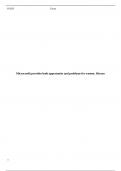PO353 Essay
Microcredit provides both opportunity and problems for women. Discuss
1
, PO353 Essay
Microcredit refers to the advancement of small loans without collateral to the poor, intended to promote
entrepreneurial activity and alleviate poverty (Banerjee and Jackson, 2016). Emerging as a key focal point of debate
within the Gendered realm of International political economy, a field focusing on the interdisciplinary nature of
women and economic policies (Elias, 2018), the widespread use of microcredit internationally has invoked
controversy regarding its role as a financial tool for women's empowerment (Visvanathan et al., 2011). Introduced by
Muhammed Yunus in Bangladesh, 1983 marked the commencement of microcredit, a policy paradigmatic of
prevailing waves of neoliberalism and women in development (WID) interventions. With the objective to reconfigure
the role of women as financially autonomous actors (Thano, 2022), microcredit presented a clear paradox against the
deep-rooted historical legacies often skewing financial gain in favour of men, common examples including the
entitlement over property rights and the commodification of land. This essay will contribute to the existing discussion
on the opportunities and problems of microcredit, and through multiple vantage points, it will unveil microcredit as a
highly problematic development initiative. The essay will first begin by breaking down the spectrum of microcredit,
outlining the diverse conditions and structures entailed between the different models. Following this, the essay will
start with an ideology-focused perspective to evaluate the objectives of microcredit as a financial tool for women's
empowerment, underlining instances of ideological incompatibility amidst interfering patriarchal and cultural
dynamics within the environment of receivers. The discussion will later turn to a significant economic perspective,
disclosing a prevailing theoretical gap between the neoliberalist philosophy and Yunus’ flawed assumptions regarding
forces of demand and supply for microcredit-induced enterprise. Concluding with a political and institutional lens, this
account will provide additional insight into microcredit's ideological and economic shortcomings, exposing how these
problems often emanate and are further propelled by the institutional failures on behalf of microcredit institutions
(MFIs), prioritising profit-motivation (Geertz, 1962) over the initial philanthropic intentions of microcredit, evolved in
line with the developing neoliberal ideology.
In attempts to thoroughly evaluate the opportunities and problems associated with microcredit, a critical starting point
would be to outline the theory underpinning its opportunities as a financial tool alongside the diverse features and
structures of each significant model. Re-examining the definition of microcredit as the extension of small loans to
women intended to generate small income-generating activities and alleviate poverty (Visvanathan et al., 2011), the
objectives of this intervention strongly parallel earlier momentous neoliberalist ideology. Acknowledged as a political
ideology advocating for political and economic institutions to adhere to more robust liberal and capitalist policies
(Metcalf, 2017), the neoliberal wave redirected responsibility from the state onto the individual, grounded on
optimising human welfare (Outcalt, 2019). Coined by Yunus as ‘bringing capitalism to the poor’ (Mainsah et al.,
2004), microcredit was emblematic of this movement, with its objectives to stimulate female entrepreneurship and its
market-based approach. Microcredit later in the millennial era experienced a repackaging of its development
objectives as a financial tool, extending to alleviate poverty and promote gender equality (Visvanathan et al., 2011).
Positively accepted as part of the neoliberal project, microcredit institutions (MFIs) developed different models
contingent on global divergent socioeconomic contexts, and while all aligned to provide small loans to women for the
2




